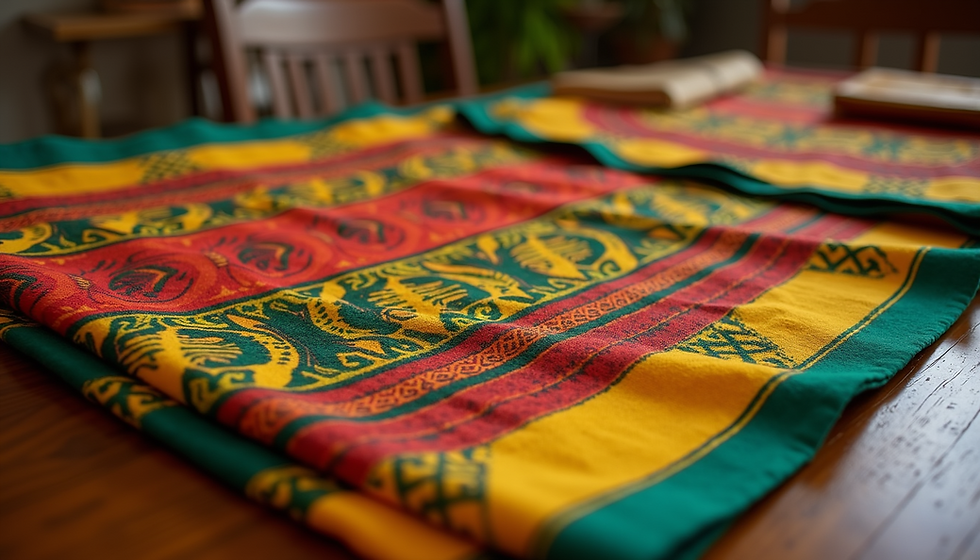The Value of Handmade African Products
- Omar Diouf
- Oct 27
- 4 min read
When I first stumbled upon the world of African handmade crafts, I was instantly captivated. There’s something magical about objects that carry the soul of a culture, the hands of an artisan, and the stories of generations. These are not just products; they are legacies crafted with care, passion, and tradition. Today, I want to take you on a journey through the vibrant world of handmade African products and why they hold such immense value—not just as commodities, but as cultural treasures.
Crafting African Legacy: More Than Just Artifacts
African handmade products are a vivid tapestry of history, culture, and creativity. Each piece tells a story, often passed down through families and communities. When you hold a handwoven basket or wear a beaded necklace, you’re connecting with centuries of tradition.
What makes these products truly special is the crafting African legacy behind them. Artisans use techniques that have been refined over decades, sometimes centuries. These skills are not learned overnight; they are inherited, nurtured, and perfected. This legacy is alive in every stitch, every bead, and every brushstroke.
For example, the intricate patterns on Kente cloth from Ghana are not just decorative. They symbolize proverbs, historical events, and social status. Owning such a piece means owning a fragment of African history. It’s like wearing a story on your sleeve—literally!

Why Handmade African Products Matter Today
In a world dominated by mass production and fast fashion, handmade African products stand out as beacons of authenticity and sustainability. They remind us that quality and meaning matter more than quantity.
Supporting these products means supporting the artisans—many of whom are women—who pour their hearts into their craft. This is not just about buying a product; it’s about empowering communities and preserving cultural heritage.
Here’s why I believe handmade African products deserve your attention:
Sustainability: These products are made using natural materials and traditional methods that have minimal environmental impact.
Uniqueness: No two pieces are exactly alike. Each item carries the artisan’s personal touch.
Economic Impact: Purchasing these goods helps provide fair wages and supports local economies.
Cultural Preservation: Buying these products helps keep ancient crafts alive in a rapidly changing world.
I remember buying a hand-carved wooden mask from a small village market. It wasn’t just a souvenir; it was a symbol of resilience and creativity. Every time I look at it, I’m reminded of the artisan’s dedication and the culture it represents.
The Artisans Behind the Craft
One of the most beautiful aspects of handmade African products is the human connection. These items are not churned out by machines but lovingly created by skilled artisans. Many of these artisans are women who have honed their craft over years, balancing tradition with innovation.
Take, for instance, the beadwork from the Maasai community. Each bead is carefully selected and strung to create patterns that signify age, marital status, and social roles. The artisans are not just creators; they are historians, educators, and cultural ambassadors.
Supporting these artisans means more than just buying a product. It means investing in education, healthcare, and better living conditions for entire communities. It’s a ripple effect that starts with a single purchase and spreads far beyond.

How to Choose Authentic Handmade African Products
With the growing popularity of African crafts, it’s easy to get lost in a sea of imitations and mass-produced items. So, how do you ensure you’re buying authentic handmade African products?
Here are some practical tips:
Buy from reputable sources: Look for platforms and stores that work directly with artisans or trusted cooperatives.
Ask about the origin: Genuine products often come with stories about the artisan or the community.
Check the materials: Authentic items use natural, locally sourced materials.
Look for imperfections: Handmade means unique, so slight variations are a good sign.
Support fair trade: Ensure the artisans receive fair compensation for their work.
One of my favorite online destinations for authentic African crafts is Sene African Queen. They showcase a stunning range of handmade African products, each with a story and a purpose. Shopping there feels like joining a global community that values culture and craftsmanship.
Bringing African Craftsmanship Into Your Life
Incorporating handmade African products into your daily life is not just about decoration or fashion—it’s about embracing a philosophy of mindful consumption and cultural appreciation.
Here are some ideas to get started:
Home décor: Add handwoven baskets, carved wooden sculptures, or vibrant textiles to your living space.
Fashion: Wear jewelry, scarves, or clothing that reflect African artistry.
Gifts: Share the beauty of African crafts with friends and family.
Culinary tools: Use handmade wooden utensils or pottery for an authentic touch.
I once gifted a friend a hand-painted calabash bowl. She was amazed not only by its beauty but also by the story behind it. It sparked conversations about culture, tradition, and the importance of supporting artisans worldwide.
By choosing these products, you’re not just buying an item—you’re embracing a legacy, supporting a community, and celebrating a culture that has so much to offer.
Keeping the Legacy Alive
The value of handmade African products goes far beyond their physical form. They are vessels of culture, history, and identity. By supporting these crafts, we help keep traditions alive and empower the artisans who create them.
Every purchase is a vote for sustainability, authenticity, and cultural preservation. It’s a way to say, “I see you. I value your work. I want your story to continue.”
So next time you’re looking for something unique, meaningful, and beautiful, consider exploring the world of handmade African products. You’ll be surprised how much joy and connection a single handcrafted item can bring into your life.
Let’s keep crafting African legacy—one beautiful piece at a time.





Comments